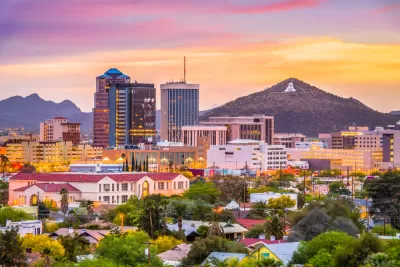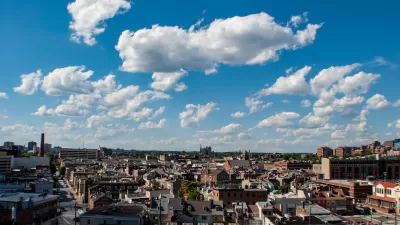Median rent in Tucson rose by 30 percent since a year ago, prompting fears of displacement among many residents struggling to afford housing.

“Rents are going up all over Arizona, as they are across the country, but Tucson, once considered sleepy and affordable, has seen a particularly painful spike.” As Brenda Muñoz Murguia reports in Phoenix Business Journal, “The median rent in Tucson in June was $1,795, up 30% from June 2021, according to Zillow data as of publication.” This is leading many longtime residents to relocate farther from the city center to more affordable neighborhoods.
“The redevelopment and push for upscale housing has put particular pressure on west Tucson and downtown.” According to the article, “Older neighborhoods that traditionally were lower income and predominantly Hispanic are transitioning to market-rate housing, pressured by new developments in nearby areas, with apartments renting for as much as $3,000 a month.”
Murguia points to one major factor impacting the desirability of these areas: the city’s “Government Property Lease Excise Tax, or GPLET, a tool that gives the city authority to grant incentives to build in particular areas.” Since its inception, Tucson has entered into 24 GPLET agreements, some of which converted affordable senior housing to luxury rentals. It should be noted that a 2021 study by University of Arizona professor Gary Pivo “found that GPLET projects were not the cause of gentrification, mainly because they constitute a small part of downtown development. However, it also said the GPLET program could do more to help people and businesses being displaced.” Pivo’s report “said GPLET should look for opportunities to create affordable housing for people who earn less than $35,000 a year.” Anecdotally, the article features the stories of several Tucson residents who struggle to afford housing and have had to move as rents rose.
FULL STORY: Rent hikes, downtown boom spur gentrification of older Tucson neighborhoods

Planetizen Federal Action Tracker
A weekly monitor of how Trump’s orders and actions are impacting planners and planning in America.

Congressman Proposes Bill to Rename DC Metro “Trump Train”
The Make Autorail Great Again Act would withhold federal funding to the system until the Washington Metropolitan Area Transit Authority (WMATA), rebrands as the Washington Metropolitan Authority for Greater Access (WMAGA).

DARTSpace Platform Streamlines Dallas TOD Application Process
The Dallas transit agency hopes a shorter permitting timeline will boost transit-oriented development around rail stations.

LA County Creating Action Plan to Tackle Extreme Heat
Los Angeles County is creating a Heat Action Plan to help communities stay safe during extreme heat, with steps like adding more shade, improving buildings, and supporting the neighborhoods most at risk.

Maryland Plans Quick-Build Complete Streets Projects
The state will use low-cost interventions to improve road safety in five Maryland counties.

Downtown Los Angeles Gears Up for Growth
A new report highlights Downtown L.A.’s ongoing revival through major housing projects, adaptive reuse, hospitality growth, and preparations for global events in the years ahead.
Urban Design for Planners 1: Software Tools
This six-course series explores essential urban design concepts using open source software and equips planners with the tools they need to participate fully in the urban design process.
Planning for Universal Design
Learn the tools for implementing Universal Design in planning regulations.
City of Charlotte
Municipality of Princeton
Roanoke Valley-Alleghany Regional Commission
City of Camden Redevelopment Agency
City of Astoria
Transportation Research & Education Center (TREC) at Portland State University
US High Speed Rail Association
City of Camden Redevelopment Agency
Municipality of Princeton (NJ)





























